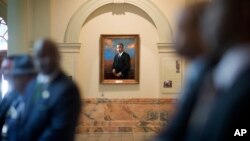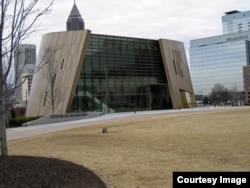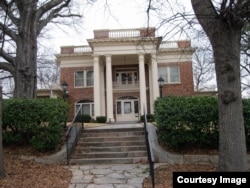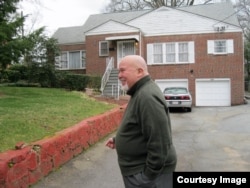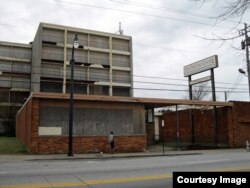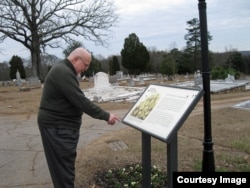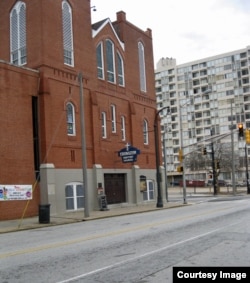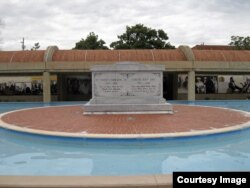Tom Houck is a lifelong U.S. civil rights activist. In 1965, the white high school student traveled to Selma, Alabama, to participate in the march there, led by the Rev. Martin Luther King Jr. He stayed on as a volunteer to help register African-Americans to vote.
An invitation to Sunday lunch with King and his family led to a job driving his children to school, as a personal assistant to the family. Houck got to know the Kings and Atlanta intimately.
Now, five decades later, Houck is sharing that knowledge with visitors to Atlanta, taking them to places where prominent African-Americans and civil rights leaders lived, worked and played.
Houck’s Civil Rights Tour of Atlanta begins at the city’s new National Center for Civil and Human Rights.
He explains that when he moved here in 1966, Atlanta was the hub of America’s civil rights movement.
"This was the place where the leaders lived," he said. "This was the place the strategy was made."
He notes that Atlanta’s large African-American middle class has long been politically active.
"They started voter registration campaigns in the late '30s and '40s that were unthought of in the South," he said. "People like William Holmes Borders, Daddy King [Martin Luther King Sr.], John C. Calhoun. Those were the people who sort of set Atlanta on the course for becoming a very different city."
Vine City area
Houck’s tour heads out of downtown to a neighborhood called Vine City. Trash litters the streets, drugs are sold on streetcorners, and men loiter and drink beer from cans in paper bags. This is one of Atlanta’s roughest areas.
But one street is surprisingly different. Here, the homes are well-maintained and the sidewalks are clean. At one time, several of Atlanta’s black clergy and professionals lived here.
Houck pulls up to a modest, two-story, red brick house, the King family home for several years.
"This is the house that Dr. Martin Luther King would come back to when he was traveling and play with the kids in the front yard, play basketball in the back yard," Houck recalled. "In that garage is still one of the cars that I actually drove."
He adds, pointing across the street, "Occasionally we would notice, when I was driving him back here, an FBI agent would be parked over on the side of the street. That was the only security Dr. King had. There weren’t Atlanta police cars in front of his house. There was no posse protecting him. He came and went — even when threats were made against him, which they were constantly made against him."
On Hunter Street, now called Martin Luther King Drive, Houck stops in front of a boarded-up restaurant and hotel.
"Paschal’s," he announced. "This is history — very sad, the shape it’s in right now. The old Paschal’s. This is where people would organize the first major political campaigns in Atlanta."
Maynard Jackson, the city’s first black mayor, began his 1973 campaign here.
"This hotel would always fill with civil rights celebrities. Jesse Jackson would come to town, or Roy Wilkins, or anybody in the civil rights movement, Thurgood Marshall, they would stay at this hotel," Houck said. "Particularly in the times when Jim Crow laws prohibited people from staying in white hotels, this is the place."
But now, like many of the buildings along Martin Luther King Drive, Paschal’s has been abandoned.
The tour continues across Joseph E. Lowry Boulevard — one of many streets renamed to honor civil rights leaders. Houck shakes his head as he observes that the reality does not always reflect the high-minded symbolism.
"It’s sad to say, that all these streets that [are] named for the civil rights icons and legends are in neighborhoods that are not being revitalized and have not been revitalized, and the streets do not live up to the worthiness of the people that the streets are named for," he said.
Houck takes visitors past Morehouse College, the all-male college King attended, as did Jackson, Julian Bond, and author and activist W.E.B. Dubois. Spellman College, for women, is next door. Over the past century, thousands of minority students have graduated from the two schools, which are now part of Atlanta University.
Famous cemetery
On Atlanta’s east side is South-View Cemetery. Founded in 1886, it offered African-Americans an alternative to burial in segregated cemeteries.
It is "probably the most famous African-American cemetery in America," according to Houck.
"This was the place that was Dr. King’s first resting place after his funeral. His father and mother both are buried here, Daddy King and Alberta King," he continued. "There is row after row of famous Atlantans who built the black community in Atlanta that are buried at this cemetery."
The tour concludes on Auburn Avenue, in central Atlanta, which was the center of the city's black community. The Southern Christian Leadership Conference had its headquarters here. This is where Citizens Trust Bank, the first major black bank in America, was located; where Atlanta Life Insurance, the first major black insurance company was started; and where the prominent black newspaper, the Daily World, was published for years.
Ebenezer Baptist Church, where King preached, is here, and still an active congregation.
King grew up on this street, Houck notes, adding, "It was from this street where great power in terms of politics and in terms of social change took place."
Most of the churches, clubs, restaurants and small businesses that stood on Auburn Avenue are gone now, but the street is being revitalized. It’s become a national historic site, commemorating King and his works.
Replicas of his Bible and Nobel Peace Prize are on display at the King Center. A white marble crypt, containing the remains of King and his wife, Coretta, sits in the middle of a reflecting pool.
But Houck says the contributions of many of the people and places important to the civil rights movement are overlooked.
"I looked around Atlanta over the last couple of years," he said, "and realized that so much of the civil rights history of this town has not been actually portrayed in a way that people from around the world would know how important this town was."
He hopes his tour will change that.




